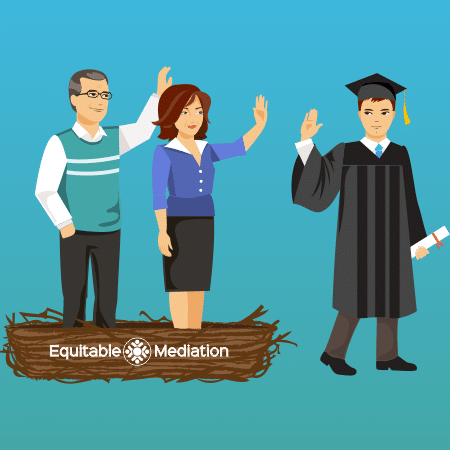- Divorce after 20 years is a complex undertaking with a lot at stake.
- There's very little guidance on how things should be divided and decided and both family and financial dynamics will play key roles in how you move forward.
- Here's what you can do to understand the issues you'll be facing and plan a smart course of action to preserve wealth and minimize legal bills if you're divorcing after 20 years or more.
If you've decided to divorce after 20 years or longer, you're probably feeling very alone. Like you're the only couple in the world facing divorce after 50.
But despite what you hear about the falling rate of divorce proceedings, getting divorced after 20 years of marriage - even after 25 and 30 years for that matter, is not only common these days, but it's on the rise.
According to Bowling Green University's National Center for Family & Marriage Research, from 1990 to 2019, divorce rates increased for married couples age 45 and older. So has the divorce rate for the 65 and older population!
There are many reasons for a gray divorce, which are also referred to as mid-life divorces.
But regardless of why older couples are choosing to divorce after staying together for so many years, it’s important to understand that divorce in a long term marriage is markedly different and much more complicated than divorce after short term marriages or divorce after 10 years.
Let's take a closer look at how divorcing after 20 years of marriage (or more) can impact the specific financial, emotional, and parental issues you'll face as you go through your divorce.
Divorce after 20 Years of Marriage
There are significant personal and parental challenges that come with a divorce after 20 years. Not to mention issues a couple might face concerning financial topics like child support and alimony.
How your children will take the news of your divorce:
If you and your spouse are divorcing after 50, chances are good you have teenage children. And you might have been wanting to file for divorce for quite some time, but deliberately waited until the kids were older to minimize the disruption to their lives.
The teenage years are unique in a child’s development because, in this stage, the child is discovering his/her own identity. And the focus of their life is no longer on the home and parents, but on school, peers and independence.
But that being said, adolescents are very aware of what’s going on in their parents’ lives - especially since recent pandemic stay-at-home orders have allowed them to see you both "up close and personal" - and they can be very critical about the situation.
Most of the time, they will not accept divorce as an answer and their reaction to your divorce after 20 years is likely to be less than favorable.
In fact, it might be downright hostile. And they have the vocabulary (and technology) to tell you exactly how they feel.
It will be important for you to be aware of this so you can help your kids cope with the divorce.
Making ends meet after your divorce case is final:
Divorce only creates expense, not income. And it goes without saying that two households are more expensive to run than one.
So if your role in the marriage was to work inside the home and raise the children, and your kids are still in high school, your job isn't finished yet. Plus, you've been out of the workforce for many years.
Divorce for stay-at-home moms or dads have their own challenges and it can be difficult (or take a while) for you to get a good job to increase income and help make ends meet after the divorce.
Because alimony alone simply may not be enough.
What to do with your marital home:
 If you have teenagers, you might want to keep the house for the sake of the children to minimize the upheaval the divorce will have on their family life and schoolwork.
If you have teenagers, you might want to keep the house for the sake of the children to minimize the upheaval the divorce will have on their family life and schoolwork.
But since the house is often the most significant marital asset a couple owns, if that's the case, it means you need to figure out how to financially support two separate households with one spouse staying in the marital home while the other finds another place to live.
Unless, of course, you decide to both remain in the marital home for some time after your divorce. And that comes with other challenges.
Your divorce parenting plan:
The teenage years are when kids need both parents the most, even though they insist they don't need them at all.
So if you're divorcing after 20 years of marriage and one of you moves out of the marital home, it could make keeping an eye on your kids to make sure they're not getting into trouble more difficult.
Teenagers are very good at sneaking around, and enforcing rules and maintaining a united front as parents when divorcing after 20 years may become even more difficult when you're no longer living in the same house.
Child Support, Alimony and the 20 Year Marriage
In addition to the personal challenges you face when divorcing after 20 years of marriage, there can also be other problems you're not even aware of.
For example, when it comes to determining child support for teenagers, some states allow for a much higher child support award to be granted than for younger children.
Then there's what happens to alimony (also known as maintenance or spousal support in some states).
For example, recent alimony reform in New Jersey has a provision that states for marriages that last 20 years or less, the length of alimony payments cannot exceed the length of the marriage unless a judge decides there are exceptional circumstances.
So in the past, a former spouse who got divorced after a 20 years marriage might have been eligible to receive permanent alimony if they were the lower earning spouse. But today, there are no guarantees and your financial future might not be as secure as you'd like to think.
Starting to see why divorce after 20 year marriage is so complex?
Divorcing after 25 Years of Marriage
 Much like divorce after 20 years, marriages ending after 25 years will center around issues related to children and finances.
Much like divorce after 20 years, marriages ending after 25 years will center around issues related to children and finances.
Divorce after 25 years most likely means at least one of your children is in college. Which means once again, you might be wrestling with what to do with your marital home.
If you're facing divorce as an empty nester, you'll need to ask yourself how important it is for your kids to return to the house they grew up in on holidays and school breaks. Or if it's ok to sell the house now since the kids are primarily living at school for most of the year. You may also need to strongly consider the distinct possibility of them "boomeranging" back home once they've graduated!
Then there's the issue of the equity in the home. When divorcing after 25 years of marriage, there's a good chance your house is fully or almost paid off. And that means one of two things.
Either:
- One of you is going to have to procure a hefty mortgage to buy the other party out of their share of the equity in the home; or
- You'll each walk away with a nice chunk of equity to put down on a place of your own after the divorce process is finished.
In both of these cases, if you're the spouse who worked inside the home raising the children, getting approved for a mortgage without an income history is going to be tough.
So regardless of whether or not you want to buy your spouse out of the marital home, or prefer to buy a place of your own, doing so may prove challenging.
Child Support, Alimony and the 25 Year Marriage
Then there's the issue of your collective financial futures.
You and your spouse are most likely in your 50's. And if your role was to raise the children, you've probably been out of the workforce for many years. Even if you got a job when they graduated from high school just to keep yourself busy, it's unlikely the pay is enough for you to support yourself solely on what you take home.
So again, alimony is going to come into play.
But some states are now moving towards terminating the payment of alimony upon retirement of the paying spouse (usually age 67). That means even when divorcing after 25 years of marriage, you may only be receiving alimony for a few years.
And it might not be enough time for you to get back on your feet and establish your own separate life.
On the flip side, there are still states which allow for what's commonly referred to as "permanent alimony." Meaning in long-term marriages, alimony payments will terminate when either the recipient spouse gets remarried or one of you is no longer on this earth.
Let's say you got married in your early 20's, which is pretty common for our Illinois clients, and you're now getting a divorce after 25 years of marriage. That puts you and your spouse in your late 40's or early 50's.
There's now a very good chance that one of you could be paying alimony for longer than you were married.
Another interesting development is in the area of who pays for college when parents divorce after 25 years.
Couples are often surprised to find out that if they remain married, they'd have no formal obligation to pay for their children's college education. Even though they may choose to do so on their own.
But when they get divorced after 25 years, in some states like Illinois and New Jersey, suddenly they are required to pay for college!
Making the negotiation of property division (handled through the equitable distribution or community property process depending on where you live), especially critical.
Divorce after 30 Years - What to Expect:
If you're facing legal separation or divorce after 30 years, there's an excellent chance your children are grown. So while you might not have to worry about things like child custody, child support or visitation schedules, your adult children will still be affected by your divorce, so don't assume they won't!
Plus, there are a whole host of new issues that you'll have to face.
Retirement:
 After your retirement accounts have been divided, whatever you’re left with following your divorce after 30 years of marriage may simply not be enough to financially support yourself into your golden years.
After your retirement accounts have been divided, whatever you’re left with following your divorce after 30 years of marriage may simply not be enough to financially support yourself into your golden years.
And if your spouse was the one managing the household finances, you may also need to find someone to take over that role.
Not to mention because you’re divorcing over 50, you have a shorter period to build your retirement savings back up. Especially if you're the one paying alimony.
On the other hand, if you’ve been out of the workforce for many years, you also may not have time to establish a new career that will enable you to put away enough money for your future.
You may need to lower your lifestyle and even consider moving to an area with a lower cost of living.
Health Insurance:
If you're divorcing after 30 years, you might be in your late 50's to early 60's. And still not old enough to qualify for Medicare. If that's the case, you'll need to procure your own health insurance.
If you're currently employed outside the home, and you've got a job that provides benefits, you're set.
But if you were the spouse who worked inside the home, and you've been covered by your husband or wife's policy, you'll need to seek out your own coverage. Your options are to either continue on your ex's plan through COBRA for up to 36 months or choose a provider on the health insurance marketplace.
Either way, given the skyrocketing cost of premiums, affordable health care coverage will be a real challenge.
Family Dynamics:
Things will change significantly when your relationship ends in divorce after 30 years of marriage.
Divorce after 30 years means the matriarch and patriarch of the family will be living separately after many years of sharing a home, which means that holidays and get-togethers will most likely change.
You or your spouse might move in with your children.
Or your children or even grandchildren may move in with you, their newly divorced grandma or grandpa.
Regardless of how everything plays out when the dust settles, there’s a good chance that the dynamics of your family will have a new look. And getting everyone to accept that and operate as a "detached family unit" may be a bit bumpy at least at first.
Caregiving:
When getting a divorce after 30 years, and your spouse is no longer by your side, who will care for you as you age? You may be able to take care of yourself just fine right now, but what about in 10, 15, or 20 years?
Will you remarry?
Will your children step up?
Or, will you have to set aside finances to pay for caregiving expenses when the time comes?
These are big issues both you and your spouse will need to wrestle with. And none of them have easy answers.
With Some Careful Planning, Divorce after 50 Can be Wonderful!
 No matter how old you are, divorce will impact you financially, emotionally, parentally, and in just about every other aspect of your life.
No matter how old you are, divorce will impact you financially, emotionally, parentally, and in just about every other aspect of your life.
But while divorce after 50 will mark the end of one part of your life, it can be the start of a whole new beginning.
The key is to take the time upfront to do everything you can to prepare for divorce and plan a course of action before filing divorce papers.
You'll increase your ability to divorce out of court using divorce mediation and get through this difficult time in your life in the healthiest possible way. So you can heal, move forward and create a happy and financially secure future.
Early in the divorce process?
The choices you make before you start your divorce are critical.

Regardless of how many years you've been married, whether you're the one who wants the divorce, your spouse does or you're both on the same page, the choices you make before you start your divorce will likely set the tone for how the entire process will unfold for you and your children.
And how peaceful, child-focused, and fair divorce will be.
But you can only make smart choices if you take the time to get educated and prepare for divorce first.
Learn How
Other Useful Resources:



 If you have teenagers, you might want to keep the house for the sake of the children to minimize the upheaval the divorce will have on their family life and schoolwork.
If you have teenagers, you might want to keep the house for the sake of the children to minimize the upheaval the divorce will have on their family life and schoolwork. Much like divorce after 20 years, marriages ending after 25 years will center around issues related to children and finances.
Much like divorce after 20 years, marriages ending after 25 years will center around issues related to children and finances. After your retirement accounts have been divided, whatever you’re left with following your divorce after 30 years of marriage may simply not be enough to financially support yourself into your golden years.
After your retirement accounts have been divided, whatever you’re left with following your divorce after 30 years of marriage may simply not be enough to financially support yourself into your golden years. No matter how old you are, divorce will impact you financially, emotionally, parentally, and in just about every other aspect of your life.
No matter how old you are, divorce will impact you financially, emotionally, parentally, and in just about every other aspect of your life.
